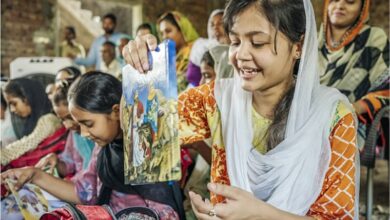The amazing ways North Koreans secretly share the Gospel
A pastor and two North Korean Christians who defected from the hermit kingdom without being captured have revealed the creative ways they continue to share the Gospel with those back home.
Peter Jung, a pastor who specializes in spreading Christianity in North Korea, recently told The Associated Press that his group provides shelter, food, and money to North Koreans visiting Chinese border towns before teaching them about Christianity.
Before they return home, Jung said his group asks the North Korean visitors to memorize Bible verses or carry Bibles with them to share the Gospel with their friends and family. He revealed that missionaries create a “religious atmosphere” by getting people to exchange text messages containing Christian-themed words like “peace.”
Christianity is illegal in North Korea and possessing a Bible, holding open religious services or making any attempt to build underground church networks can result in torture, lengthy prison terms or execution. As North Korea consistently ranks as the worst country in the world for Christian persecution, many citizens keep their beliefs to themselves or within their immediate families.
Lee HanByeol, Jung’s wife and a North Korean refugee living in Seoul, South Korea, recalled watching her father pray whenever his wife slipped into China to borrow money from relatives in the mid-1990s.
“I saw him praying many times. … My mom risked her life to go to China illegally to feed our family. So when my mom left, he kept praying, sitting cross-legged and trembling in the corner of our room,” Lee said.
Lee said she didn’t know about Christianity at the time, as her father kept his faith to himself until his death in an apparent effort to protect his family.
“I often think about how great it would have been if my father and I could have prayed together while holding each other’s hands,” she said.
Another North Korean defector, identified only as “J.M.,” shared how he encountered Christianity after he fled to China in 1998. He was arrested by Chinese police and sent back home in 2001, and after serving several months in prison he attempted to share his faith with his parents.
“My father found it difficult to embrace (Christianity) but my mother quickly accepted it,” said J.M.
In 2002, J.M. escaped to South Korea so he could worship freely, and is today a Seoul-based pastor trying to promote Christianity in North Korea. He told the AP that during a recent visit to China, he baptized about six North Koreans who made temporary visits to Chinese border towns.
Estimates vary about how many Christians are in North Korea, but persecution watchdog group Open Doors places the number around 300,000, most of whom operate in secret networks of tiny house churches.
According to statistics from the U.S. State Department, an estimated 120,000 Christians, defectors, and political dissidents are imprisoned in North Korean labor concentration camps where they face brutal torture. The issue was at the forefront of talks between US and North Korean officials and, observers say, President Donald Trump is said to have taken a personal interest. Having heard of the plight of Christians, Trump is said to have inquired about how the Gospel is shared and the what happens to those who are caught. The anonymous sources said the president was deeply moved by the stories.
Previously, North Korean defector Ji Hyeona shared how she escaped from the North a total of four times and got repatriated back three times before finally fleeing to South Korea in 2007.
As a devout Christian, Ji recalled how she felt forced to deny her faith when questioned by regime authorities each time she was repatriated.
“Each time when I got repatriated, which is a total of three times, they never finished their interrogation without asking me those Christian-related questions, such as whether I went to church, whether I knew Jesus and whether I believed in God,” she recalled. “If there is a slightest indication or confession that you believe Jesus and went to church, then you will surely be sent to a political prison camp or executed. Just like Peter denied Jesus three times, I lied each of those three times that I got repatriated and got interrogated.”
Ji Seong-ho, a disabled North Korea defector who founded the organization Now, Action, Unity, Human Rights, also told The Christian Post that anyone suspected of illegal religious activities is harshly punished.
The 32-year-old Ji, who lost one arm and one leg when a train ran over them while he was trying to steal coal to support his family, first defected from North Korea in 2006. He ultimately went back to North Korea after a month in China only to be detained and tortured by North Korean police.
“During the time, I was asked whether I was contacted by any Christians. I actually did meet Christians and was introduced to Christianity [when I first went to China] but I already knew that Christians, when caught by the regime, will be killed without any exceptions. So I denied that I came into contact with Christians,” Ji recalled. “During the torture, it was, of course, a very difficult experience. That was then I felt that North Korea is no longer the place I could live.”
Ji, who now helps North Korean defectors safely enter China, urged the international community “to help out with this cause to tackle the human rights situation of North Korea and create more pressure against the regime so that people would have the freedom to pray and worship God, and share the Gospel and hear the Gospel.”
“I also feel that since the Bible commands us to share the Gospel to the world and every nation, we also have to deliver the Gospel to North Korea as there can be no exception in place we need to reach out to,” he added.
–MV partners







